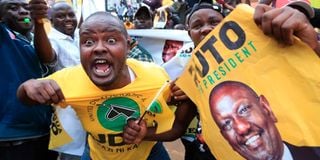Premium
Gusii votes: How Raila Odinga lost his mojo as Ruto gained foothold

Celebrations rock Kisii town as residents pour onto the streets moments after Deputy President William Ruto was declared President-elect on Monday last week.
It was supposed to be his ticket to State House. Well, at least one of the “sure bet” regions he could rely on to deliver victory in his fifth stab at the presidency.
But Azimio la Umoja One Kenya Coalition Party flagbearer Raila Odinga’s bid faltered and fell flat on the face of a sustained onslaught from his main challenger, United Democratic Alliance (UDA) candidate William Ruto.
Mr Odinga’s target was to get at least 90 per cent of the Gusii vote to add on to his Nyanza stronghold basket as he sought to lock out the Deputy President from his traditional bases, but the plan floundered and collapsed due to infighting among local leaders and lack of a well-coordinated campaign strategy.
In Kisii County, Mr Odinga garnered 65.80 per cent (265,078 votes out of 637,111 registered voters) against the DP’s 135,326 votes (33. 59 per cent). In Nyamira, the former Prime Minister got 61.84 per cent or 129,025 votes out or 323, 283 registered voters. Dr Ruto garnered 37.55 per cent, which is 78,356 votes. The voting pattern was scattered all over the political parties and the expectation that Mr Odinga would sweep the electoral map clean failed as he ended up sharing the spoils with his main challenger.
Different reasons have been advanced to explain why Mr Odinga didn’t perform as expected. Kisii and Nyamira counties form the larger Nyanza region, politically associated with Mr Odinga.
Massive support
Dr Ruto used these two counties as his entry point to Nyanza and even set up a Kenya Kwanza regional office in Kisii town.
In the lead-up to the polls, Mr Odinga enjoyed massive support, but a number of issues worked to his disadvantage towards the end of the campaign season. The infighting between former Kisii Governor James Ongwae and Governor-elect Simba Arati helped the Ruto team to regroup.
“Public altercations among the key Azimio leadership divided and discouraged their supporters. Most candidates stopped campaigning [for Mr Odinga]. Azimio had a leadership crisis in Kisii that Kenya Kwanza Alliance [a coalition led by DP Ruto] milked,” Mr Dismas Mokua, a political analyst, says.
Mr Odinga’s failure to elicit excitement in his own backyard began before election day. During the primaries, his party, the Orange Democratic Movement (ODM), installed unpopular candidates in some seats, angering voters. Corruption claims, rigging and bullying marred the process, insider sources suggest.
The effect of this apathy, observes Mr Mokua, is that, “Ruto maintained his traditional strongholds [Mt Kenya and Rift Valley] even as he raided Raila’s bases. Ruto made several trips to Kisii and Nyamira and connected with voters.”
Mr Mokua says the DP engaged in a sustained grassroots campaign led by strong candidates. The final rally, which Mr Odinga held in Kisii before the elections, was the proverbial last straw that broke the camel’s back.
Instead of backing the popular candidate, Mr Arati, Mr Odinga upbraided the outgoing Dagoretti North MP before his supporters, telling him to “respect his elders.”
This is after Mr Arati had publicly asked Mr Odinga not to give Mr Ongwae a job in his government, should he win the presidency, accusing the outgoing governor of being corrupt.
Risked voters’ rejection
“You’re my son Arati, but I’m asking you to respect elders; you can’t accuse someone of being corrupt when you have no evidence,” Mr Odinga said.
This came after a long day for Arati and his team, having been dodged by Mr Odinga’s men, to an extent that he missed to attend some scheduled rallies.
The “elders” Mr Odinga was referring to are believed to have joined hands to fight youthful Arati and did little to bring votes to their presidential candidate. Throughout the campaigns, the “elders” schemed to bring down Mr Arati, doing little to bring more votes to Mr Odinga.
After reading the public mood regarding Mr Odinga and his lieutenants, straight-shooting Kitutu Chache MP Richard Onyonka told the former premier to his face that he risked voters’ rejection if he continued letting his allies sabotage popular leaders.





